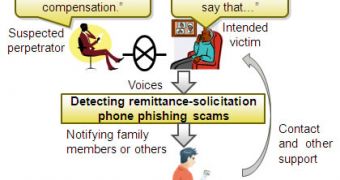The world renowned ICT firm Fujitsu, in collaboration with Nagoya University, developed a system that can detect phone phishing scams and other malicious plots based on characteristic keywords and voice analysis.
Because phone scams are an ever growing threat, researchers came up with this system that can allegedly detect an ill-purposed individual with a 90% accuracy.
People tend to place too much trust in others while on the phone and this technology should objectively evaluate a scenario and provide appropriate support for those in need.
A prototype of this technology has been implemented into mobile phones and will be thoroughly tested in collaboration with the Bank of Nagoya and the National Police Academy.
Since the system wouldn’t function properly if it were based solely on keyword detection, the researchers also leveraged a newly developed technology that analyzes changes in voice pitch and voice level.
So how does the system actually work?
When a victim is called by a perpetrator, he/she is in most cases overwhelmed by distressing information, which triggers change in the pitch and level of the voice.
Individuals who fall victims to phone phishing scams might not identify the call as being a scam, but certain voice patterns can trigger an alarm in the system.
In the meantime, every word pronounced by the attacker is scanned and compared to a word database provided by law enforcement authorities. These keywords are obtained from scam recordings, or based on the testimonies of victims.
The frequencies of words such as “compensation” and “indebtedness” are recorded in search of evidence that indicates a scam call.
If certain criteria are met, a third party (a family member, or others) is notified regarding the plot.
For now the technology is only in a testing phase, but Fujitsu and Nagoya University hope that in the future it can be implemented in mobile phones on a large scale.

 14 DAY TRIAL //
14 DAY TRIAL //